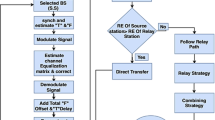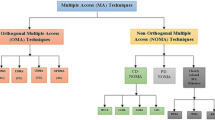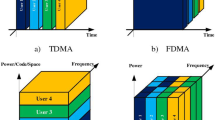Abstract
The opportunistic cooperation schemes, where only the “best” relay is selected to forward the message, have been widely investigated recently for their good performance in terms of outage probability. However, the unfair selections of relays may cause unbalance power consumptions among relays, which reduces the lifetime of energy constrained networks. In this paper, we introduce a novel concept of outage priority based fairness (OPF), aiming at improving the selection fairness among relays appropriately without outage performance deterioration. Then, a cooperation scheme is proposed to meet this concept, and corresponding theoretical analysis is also provided. Afterward, based on OPF, the achievable upper bound of the fairness is derived, and an optimal cross-layer designed scheme is also provided to achieve the bound. Numerical simulations are carried out finally, which not only validate the theoretical analysis, but also show that taking advantages of the proposed schemes, the fairness among all relays, as well as the network lifetime, can be greatly improved without any loss of outage performance, especially in high SNR regime.
Similar content being viewed by others
References
Wang J, Milstein L B. CDMA overlay situations for microcellular mobile communications. IEEE Trans Commun, 1995, 43: 603–614
Wang J, Chen J. Performance of wideband CDMA systems with complex spreading and imperfect channel estimation. IEEE J Sel Area Commun, 2001, 19: 152–163
Sendonaris A, Erkip E, Aazhang B. User cooperation diversity-part I: system description. IEEE Trans Commun, 2003, 51: 1927–1938
Laneman J N, Tse D, Wornell G W. Cooperative diversity in wireless networks: efficient protocols and outage behavior. IEEE Trans Inf Theory, 2004, 50: 3062–3080
Nabar R U, Bolcskei H, Kneubuhler F W. Fading relay channels: performance limits and space-time signal design. IEEE J Sel Area Commun, 2004, 22: 1099–1109
Sun L, Zhang T, Lu L, et al. Cooperative communications with relay selection in wireless sensor networks. IEEE Trans Consumer Electron, 2009, 55: 513–517
Xu J, Choi J Y, Seo J S. Distributed space-time coding and equalization for cooperative cellular communication system. IEEE Trans Consumer Electron, 2008, 54: 47–51
Bletsas A, Khisti A, Reed D P, et al. A simple cooperative diversity method based on network path selection. IEEE J Sel Area Commun, 2006, 24: 659–672
Laneman J N, Wornell G W. Distributed space-time coded protocols for exploiting cooperative diversity in wireless networks. IEEE Trans Inf Theory, 2003, 49: 2415–2425
Bletsas A, Shin H, Win M Z. Cooperative communications with outage-optimal opportunistic relaying. IEEE Trans Wirel Commun, 2007, 6: 3450–3460
Dai L, Chen W, Cimini L J, et al. Fairness improves throughput in energy-constrained cooperative ad-hoc networks. IEEE Trans Wirel Commun, 2009, 8: 3679–3691
Lau V K. Proportional fair space-time scheduling for wireless communications. IEEE Trans Commun, 2005, 53: 1353–1360
Michalopoulos D S, Karagiannidis G K. PHY-layer fairness in amplify and forward cooperative diversity systems. IEEE Trans Wirel Commun, 2008, 7: 1073–1083
Liu J, Lu K, Cai X, et al. Regenerative cooperative diversity with path selection and equal power consumption in wireless networks. IEEE Trans Wirel Commun, 2009, 8: 3926–3932
Li Y, Yin Q, Wang J. Outage-optimal relaying through opportunistic hybrid forward cooperation. Sci China Inf Sci, 2011, 54: 1264–1273
Li Y, Yin Q, Wang C. Beamforming based decode-and-forward cooperation via backward synchronization. Sci China Inf Sci, 2012, 4: 805–814
Wang H M, Xia X G, Yin Q. Computationally efficient equalization for asynchronous cooperative communications with multiple frequency offsets. IEEE Trans Wirel Commun, 2009, 8: 648–655
Wang H M, Yin Q, Xia X G. Full diversity space-frequency codes for frequency asynchronous cooperative relay networks with linear receivers. IEEE Trans Commun, 2011, 59: 3607–3617
Wang H M, Xia X G. Asynchronous cooperative communication systems: a survey on signal designs. Sci China Inf Sci, 2011, 54: 1547–1561
Elliott R. A measure of fairness of scheduling algorithms in multiuser systems. In: Proc IEEE CCECE, Winnipeg, MB, 2002. 1583–1588
Zhu H, Wang J. Chunk-based resource allocation in OFDMA systems — part I: chunk allocation. IEEE Trans Commun, 2009, 57: 2734–2744
Tse D, Viswanath P. Fundamentals of Wireless Communication. New York: Cambridge University, 2005
Gündüz D, Erkip E. Opportunistic cooperation by dynamic resource allocation. I IEEE Trans Wirel Commun, 2007, 6: 1446–1454
Author information
Authors and Affiliations
Corresponding author
Rights and permissions
About this article
Cite this article
Li, Y., Wang, H., Yin, Q. et al. Fair relay selection in decode-and-forward cooperation based on outage priority. Sci. China Inf. Sci. 56, 1–10 (2013). https://doi.org/10.1007/s11432-012-4658-8
Received:
Accepted:
Published:
Issue Date:
DOI: https://doi.org/10.1007/s11432-012-4658-8




